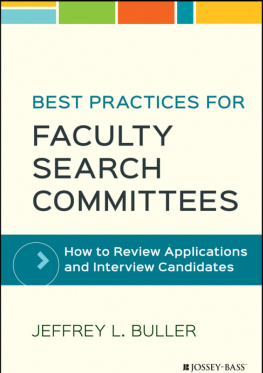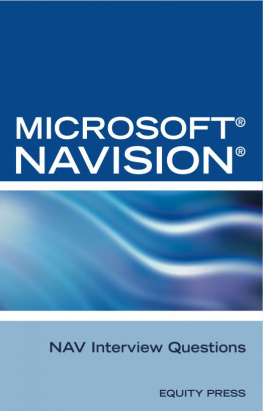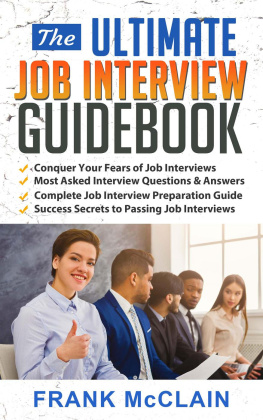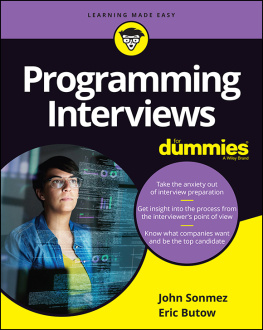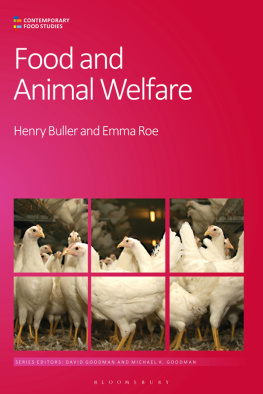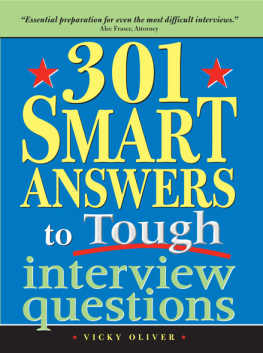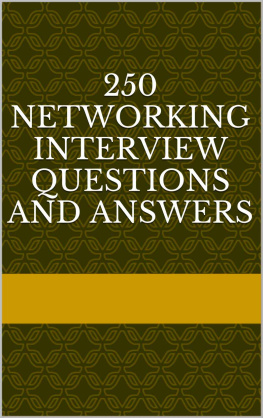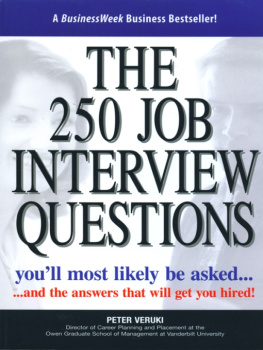Buller Jeffrey L. - How to Review Applications and Interview Candidates
Here you can read online Buller Jeffrey L. - How to Review Applications and Interview Candidates full text of the book (entire story) in english for free. Download pdf and epub, get meaning, cover and reviews about this ebook. year: 2017, genre: Politics. Description of the work, (preface) as well as reviews are available. Best literature library LitArk.com created for fans of good reading and offers a wide selection of genres:
Romance novel
Science fiction
Adventure
Detective
Science
History
Home and family
Prose
Art
Politics
Computer
Non-fiction
Religion
Business
Children
Humor
Choose a favorite category and find really read worthwhile books. Enjoy immersion in the world of imagination, feel the emotions of the characters or learn something new for yourself, make an fascinating discovery.
- Book:How to Review Applications and Interview Candidates
- Author:
- Genre:
- Year:2017
- Rating:5 / 5
- Favourites:Add to favourites
- Your mark:
- 100
- 1
- 2
- 3
- 4
- 5
How to Review Applications and Interview Candidates: summary, description and annotation
We offer to read an annotation, description, summary or preface (depends on what the author of the book "How to Review Applications and Interview Candidates" wrote himself). If you haven't found the necessary information about the book — write in the comments, we will try to find it.
How to Review Applications and Interview Candidates — read online for free the complete book (whole text) full work
Below is the text of the book, divided by pages. System saving the place of the last page read, allows you to conveniently read the book "How to Review Applications and Interview Candidates" online for free, without having to search again every time where you left off. Put a bookmark, and you can go to the page where you finished reading at any time.
Font size:
Interval:
Bookmark:

A Toolkit for College Professors (with Robert E. Cipriano)
A Toolkit for Department Chairs (with Robert E. Cipriano)
Academic Leadership Day by Day: Small Steps That Lead to Great Success
Best Practices in Faculty Evaluation: A Practical Guide for Academic Leaders
Building Academic Leadership Capacity: A Guide to Best Practices (with Walter H. Gmelch)
Change Leadership in Higher Education: A Practical Guide to Academic Transformation
Going for the Gold: How to Become a World-Class Academic Fundraiser (with Dianne M. Reeves)
Positive Academic Leadership: How to Stop Putting Out Fires and Start Making a Difference
The Essential Academic Dean or Provost: A Comprehensive Desk Reference, Second Edition
The Essential College Professor: A Practical Guide to an Academic Career
The Essential Department Chair: A Comprehensive Desk Reference, Second Edition
World-Class Fundraising Isnt a Solo Sport: The Team Approach to Academic Fundraising (with Dianne M. Reeves)
Copyright 2017 by John Wiley & Sons, Inc. All rights reserved.
Published by Jossey-Bass
A Wiley Brand
One Montgomery Street, Suite 1000, San Francisco, CA 94104-4594www.josseybass.com
No part of this publication may be reproduced, stored in a retrieval system, or transmitted in any form or by any means, electronic, mechanical, photocopying, recording, scanning, or otherwise, except as permitted under Section 107 or 108 of the 1976 United States Copyright Act, without either the prior written permission of the publisher, or authorization through payment of the appropriate per-copy fee to the Copyright Clearance Center, Inc., 222 Rosewood Drive, Danvers, MA 01923, 978-750-8400, fax 978-646-8600, or on the Web at www.copyright.com. Requests to the publisher for permission should be addressed to the Permissions Department, John Wiley & Sons, Inc., 111 River Street, Hoboken, NJ 07030, 201-748-6011, fax 201-748-6008, or online at www.wiley.com/go/permissions.
Permission is given for individual classroom teachers to reproduce the pages and illustrations for classroom use. Reproduction of these materials for an entire school system is strictly forbidden.
Limit of Liability/Disclaimer of Warranty: While the publisher and author have used their best efforts in preparing this book, they make no representations or warranties with respect to the accuracy or completeness of the contents of this book and specifically disclaim any implied warranties of merchantability or fitness for a particular purpose. No warranty may be created or extended by sales representatives or written sales materials. The advice and strategies contained herein may not be suitable for your situation. You should consult with a professional where appropriate. Neither the publisher nor author shall be liable for any loss of profit or any other commercial damages, including but not limited to special, incidental, consequential, or other damages. Readers should be aware that Internet Web sites offered as citations and/or sources for further information may have changed or disappeared between the time this was written and when it is read.
Jossey-Bass books and products are available through most bookstores. To contact Jossey-Bass directly call our Customer Care Department within the U.S. at 800-956-7739, outside the U.S. at 317-572-3986, or fax 317-572-4002.
Wiley publishes in a variety of print and electronic formats and by print-on-demand. Some material included with standard print versions of this book may not be included in e-books or in print-ondemand. If this book refers to media such as a CD or DVD that is not included in the version you purchased, you may download this material at http://booksupport.wiley.com. For more information about Wiley products, visit www.wiley.com.
Library of Congress Cataloging-in-Publication Data
Names: Buller, Jeffrey L., author.
Title: Best practices for faculty search committees: how to review applications and interview candidates / Jeffrey L. Buller.
Description: San Francisco, CA : Jossey-Bass ; Hoboken, NJ : John Wiley & Sons, 2017. | Includes bibliographical references and index.
Identifiers: LCCN 2016038235 (print) | LCCN 2016050844 (ebook) | ISBN 9781119349969 (cloth : alk. paper) | ISBN 9781119351665 (Adobe PDF) | ISBN 9781119351658 (ePub)
Subjects: LCSH: Universities and collegesFacultyEmployment. | Employment interviewing. | Employee selection.
Classification: LCC LB2332.7 .B85 2017 (print) | LCC LB2332.7 (ebook) | DDC 378.1/2dc23
LC record available at https://lccn.loc.gov/2016038235
Cover design: Wiley
FIRST EDITION
For Robert E. Cipriano (Collegial Bob) without whom ATLAS Leadership Training would not exist and my life would be immeasurably diminished.
Jeffrey L. Buller has served in administrative positions ranging from department chair to vice president for academic affairs at four very different institutions: Loras College, Georgia Southern University, Mary Baldwin College, and Florida Atlantic University. He is the author of 13 books on higher education administration, a textbook for first-year college students, and a book of essays on the music dramas of Richard Wagner. Buller has also written numerous articles on Greek and Latin literature, 19th- and 20th-century opera, and college administration. From 2003 to 2005, he served as the principal English language lecturer at the International Wagner Festival in Bayreuth, Germany. More recently, he has been active as a consultant to the Ministry of Education in Saudi Arabia, where he is assisting with the creation of a kingdom-wide academic leadership center. Along with Robert E. Cipriano, Buller is a senior partner in ATLAS: Academic Training, Leadership, & Assessment Services, through which he has presented numerous workshops on academic leadership and faculty searches.
For many faculty members, serving on a search committee is one of those activities that they think they ought to understandafter all, when they themselves were applicants, they did well enough with at least one search committee to be offered a jobbut that becomes more and more puzzling the further they become involved in the process. Why do institutions have all these cumbersome procedures they have to follow? How can the search committee deal with reading all the applications that come in and still have time for its members to do their teaching and research? What questions do you ask in an interview to find out the things that you really want to know? What questions shouldn't you ask, and how much trouble will you be in if you do? Although there are a few resources available on the technical aspects of how to run a search, a search committee will find very little available to review quickly so that they can get their task done properly and efficiently. As a result, faculty searches can be hit or miss. Sometimes everything seems to fall into place, and the search committee ends up hiring a wonderful new faculty member who becomes not only an important colleague but also a person who brings new vitality to the discipline. At other times, the applicant who seemed so perfect on paper and during the interview ends up being a very different type of person once the hiring process is complete, and the program as a whole suffers as a result.
This brief guidebook is intended to help make faculty search committees more effective and to make the work of serving on one if not easy then at least a little easier than it otherwise might have been. I wrote this book with busy college professors in mind, keeping what they need to know clear, concise, and above all practical. You're probably not reading this book to gain a theoretical overview of how faculty searches potentially could be run. You're probably reading it because you're involved in a search
Next pageFont size:
Interval:
Bookmark:
Similar books «How to Review Applications and Interview Candidates»
Look at similar books to How to Review Applications and Interview Candidates. We have selected literature similar in name and meaning in the hope of providing readers with more options to find new, interesting, not yet read works.
Discussion, reviews of the book How to Review Applications and Interview Candidates and just readers' own opinions. Leave your comments, write what you think about the work, its meaning or the main characters. Specify what exactly you liked and what you didn't like, and why you think so.

